Sempena Labour Day: How much do foreign workers earn in Malaysia?
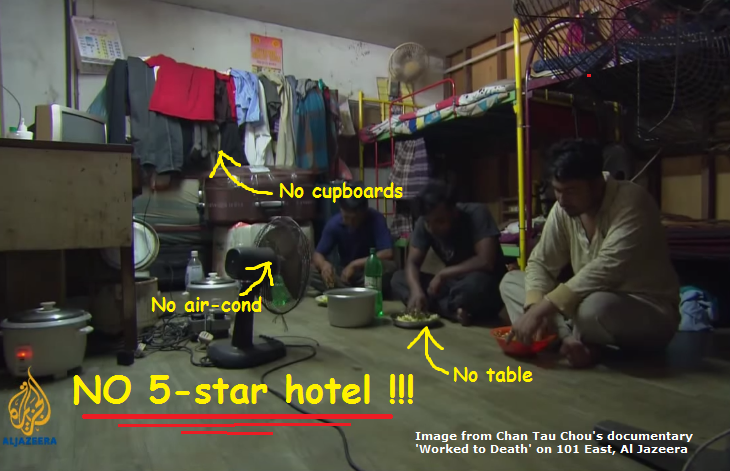
- 8.1KShares
- Facebook7.9K
- Twitter36
- LinkedIn13
- Email40
- WhatsApp122
For Labour Day, CILISOS wanted to find out how much the people who do the 3D labour (dirty, dangerous and difficult) in Malaysia, earn. It’s no secret that foreign workers in Malaysia sometimes have it quite bad. From giving them nasty looks and viewing them as less than fellow human beings – like when our Editor accidentally asked us to write about ‘foreign worker PRICES (rather than wages)‘ , to real physical abuse cases, detention centres and even deaths.
Plus, they have a crappy hero: THIS WRITER. (The number of articles I’ve written on foreign workers for CILISOS is too damn high!).
Editor’s note: we are setting aside a budget for Jolyn’s superhero costume. Thinking something like this.
But before all that, let’s take a poll!
So since tomorrow is Labour Day, we thought we’d go and talk to them, not just to find out how much they earn, but what kinda lives they live here too. And we actually went out onto the streets to ask, as well as to call a few people who were willing to share.
Here’s what we found out…
1. Security guards
When you think of Malaysian security guards, the Nepalese are the ones that always come to mind. We’ve covered them and the jobs they do in a previous article, with estimations a year ago that they earn anywhere from RM500 all the way to RM1200. Thankfully, salaries seem to have gone up a little since then, at least the ones we asked.
Bijay, Nepal, RM1,470 monthly
“As I know in Malaysia, all security guards work 12 hours a day. There’s day shift and night shift. About off-days, I don’t think so. They will deduct from our salary, therefore normally we don’t take off-days.” – Bijay Rai, security guard
Mobindra, Nepal, RM1,500 monthly
“I am here in Malaysia alone, my family members are all back in Nepal. I actually stay in an apartment near here [where he works in a shopping mall]. The lodgings are provided by the boss, but we pay for our own food. I’ve been in Malaysia for 6 years. It’s not bad here but I miss home.” – Mobindra Gurung, security guard
Thaman, Nepal, RM1,350 monthly
“I work seven days a week, with no days off. I work 12 hours a day, from 7am to 7pm. After work I usually go home. I cook my own food, so I save a lot on eating out. My rent is also paid for by the company,” – Thaman Kumar Thaman, security guard, theantdaily
2. Construction workers
PRIVATE COMPANIES:
One of our friends gave us a contact for someone who runs a private construction and renovation business called Mr. Lim.
“All my workers are from Indonesia because they are more hardy la. They earn RM2,500 – RM2,600 a month, or RM100 a day, working 8 hours. Anything more than that, they are paid O.T. at x1.5 rate.” – Mr. Lim, construction and renovation business owner
We also spoke to this Indonesian construction worker who once did renovation for someone in the CILISOS team. When the boss doesn’t have contracts, the workers are laid off. That’s how insecure their jobs are. He’d prefer anonymity for his own reason, so we’ll call him Joe.
Joe, Indonesia, RM1,890 monthly
“We’re paid RM70 per day with meals. Our boss also provides us lodgings, but when there is no work, we won’t receive a salary at all.” – Joe, construction worker
Also another guy who works for someone else in the team…
No-name shy guy, Indonesia, RM90 per day
We found another construction worker near our office from Indonesia. He has also done government contract buildings like MRT. According to him, the pay is pretty much the same.
Suparto, Indonesia, RM1,700 monthly
“I’ve worked in Malaysia for three years. We work 12-hour shifts at the site from 10am to 7pm. It’s not bad, this job. The money is good. I’ve also worked on the MRT site. The pay is the the same. Are you taking a photo? Tak mau…. OK, I’ll wear my mask.” – Suparto, construction worker
GOVERNMENT CONSTRUCTION:
We went to an MRT site to speak to workers. The MRT project is contracted to Gamuda and the company sub-contracts it to smaller companies, according to Vickneisan Katherason, Project Engineer at Acre Works. The private company is one of the sub-contractors.
He told us the workers are divided into two categories – specialists and ‘kongsi-kong’ (he spelt it for us). Specialists can earn RM80 per day, while the kongsi-kongs (who basically do all sorts of labour) earn RM50 to RM60 per day. They work 8 hours for 7 days, while O.T. is pro-rated. i.e. specialists about RM10 an hour, and kongsi-kongs about RM8.
Vickneisan also told us that employers hold their passports to prevent them from running away, but there was one time, one of the guys’ dad (in Indonesia) was sick and the supervisor said that they willingly gave him back his passport, and actually fetched him to the airport to let him go home. He also said that holding passports was a common thing as migrants had a reputation of running away.
3. F&B service line
Over the last 10-15 years, we’ve seen more and more migrants in our mamaks and cafes, from a wide variety of countries.
Editor’s note: I’m the oldest on the team, and I remember in my time, it was mostly college students working from anywhere between RM3-5 an hour (this was back in the 90s).
Kaivi, the Philippines, RM 1,200 monthly
“Working here is OK. I’m not alone – my aunty is here in Malaysia with me, cousins, my brother-in-law, my sort-of husband [hehe]. It’s not bad, I’ve adapted to Malaysia. The food isn’t really the same, but I quite like it. I miss the Philippines though.” – Kaivi, F&B store worker
Kyaw, Myanmar, RM1,200 monthly
“I work in a coffee shop. I earn RM1,200 a month or a day, RM40.” – Kyaw, Myanmar, RM1,200 monthly
Wellie, Indonesia, RM800 monthly
Mary, Myanmar, RM1,000 monthly
Yenny, Indonesia, RM1,050 monthly (or RM35 per day, 8-hour shift)
4. Cleaners
DOMESTIC:
Domestic helpers’ case a bit special, in a sense that they are the only ones who go through maid agencies. For other industries, foreign workers go through the Home Ministry, Persatuan Agensi Pembantu Rumah Asing Malaysia (PAPA) told us over the phone. At the moment, the majority of domestic helpers come from Indonesia, the Philippines and Sri Lanka. Their permits, including levy, working permit, and processing fee come up to about RM600 per year our source also said. According to our source in PAPA, this is the average salaries for maids:
Indonesia: RM700 per month minimum; Philippines: USD400 (RM1,400) per month minimum. This is a Filipino Government requirement for all their domestic helpers globally and is set in the maids’ contracts; Sri Lanka: RM850 per month minimum
Joyce, the Philippines, RM1,200 monthly
Joyce works for one of our friends. She has two kids back home AND she’s a graduate. This is her story:
“We are paid very low paid back in the Philippines – for example, only RM400 per month as a sales promoter [that’s why she came to Malaysia]. I have no breaks except for meals and sleeping time. Every day, I sweep and mop the floor, wash dishes, wash and hang the clothes, iron and fold them, wash the bathroom, water the plants, and tidy the whole house.” – Joyce, domestic helper
Marlyn, the Philippines, RM1,200 monthly
Maria Mona, Indonesia, RM800 monthly
COMMERCIAL:
According to Justin, who runs a part-time maid agency, their maids are paid RM700 – RM1,000 a month, that’s AFTER deduction of their RM150 monthly permit. They get full room and board. They also get OT of about RM10 an hour, which is negotiated directly with the house-owners and get to keep everything they earn there.
We also called up Madam Lim (no connection to Mr. Lim) from another agency who told us the maids are paid between RM900 – RM1,200 a month, depending whether they work on Sunday or not.
Ellis, Indonesia, RM800 monthly
“I work for a part-time maid agency. From Monday to Friday we clean three houses – four hours for each house. On the weekends we only clean two houses. We don’t get any off days, that’s why many maids run away. We started out as 18 maids, now there’s only nine of us left.” – Ellis, part-time cleaner
We found Yati [not her real name] working in a shopping mall. She’s from Indonesia. Her salary as a commercial cleaner is much higher than other Indonesians who work as domestic helpers.
Yati, Indonesia, RM1,420 monthly
When we chatted with the other cleaners, they confirmed the salary figure, but all four of them were quite reluctant to give out so much info, saying that they were on their break which is really short, so it’s very precious to them. They also didn’t want to pose for photos and one of them was worried about being seen with us. “Nanti kena saman,” she said.
5. Factory workers
Borhan Uddin, Bangladesh, RM1,450 monthly
“In the factory line, we earn between RM1,000 to RM1,450. I’ve lived in Malaysia for eight years – all the while working in the same factory. Suka… I’m here to earn a living. My family is back in Bangladesh. I’m here alone. My employer provides board for us. They pay utility bills, but we pay for our own food.” – Mohd Borhan Uddin, factory worker
Shagor Mondal, Bangladesh, RM1,420 monthly
“I’ve worked in Malaysia for 6 years and renewed my contract twice. Back in Bangladesh itself, I’ve wanted to come to work here. My boss is very good. They really look after us. We work from 8am to 5pm, with breaks at 10am, lunch time and 3pm for tea break. The boss provides lodgings for us and all our medical allowances through FOMEMA.
I am the first child in my family so I’m supporting them. I studied up to Form 4 in Bangladesh but didn’t want to continue. What to do? I never listened to my father. He owns a grocery store. He marah, I tak dengar, so I decided to find work overseas. Since I’m a Muslim, working in Malaysia is easy for me.” – Mohd Shagor Mondal, factory worker
Actually what they earn is higher than what we’d expect
We know this is not representative of ALL foreign workers in Malaysia, but we actually expected much worse. Did you? Part of the reason behind this is that Malaysia actually implemented minimum wage, although not everyone follows those conditions still. The figure was set at RM900 for Peninsula Malaysia, and RM800 for Sabah and Sarawak, in January 2013.
“With its implementation, all workers, including foreigners, will get other benefits such as a higher amount of overtime pay, taking the overall income average to between RM1,200 and RM1,500 a month.” – Datuk Seri Ahmad Husni Hanadzlah, Finance Minister II, The Star
What’s more they’ve got certain allowances covered like board, utilities and medical, so that’s really nice. As for their permits, some of them told us their bosses cover it, but for some of them their bosses deduct it off their pay.
Keep in mind that even Singapore doesn’t have minimum wage (except for cleaners, which only started last year), so YES LA WE BEAT SINGAPORE AT SOMETHING!
So are migrants really mistreated in Malaysia?
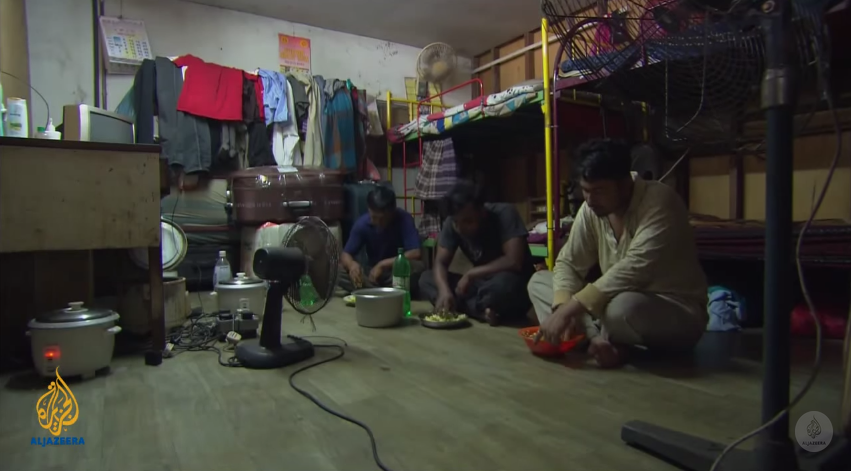
Some of the foreign workers live in slum conditions. Screenshot from Al Jazeera 101 East ‘Worked to Death’ documentary.
We did a comparison on JobStreet for jobs with similar figures. For accountants, the average salary is RM1,000 (SERIOUSLY!?), for IT , it is RM1,480, for consultants, it is RM1,800, and for sales executives, it is RM1,600, so it appears that locals aren’t much worse off. One thing to note is that these are all fresh graduate salaries for Malaysians.
Unfortunately, there are other things that came to view as we were researching this article.
a. Many of the foreign workers are grown men and women with families to support. Who would want be earning RM1,000 to RM1,800 in their 30s or 40s? Also keep in mind that we didn’t find any ‘senior’ foreign workers, although we’re sure that there are some limited career prospects. According to Datuk Shamsuddin, many of them send the majority of their salaries home. “Bank Negara calculates remittances at RM30 bil, but that’s the official number. Foreign workers also have send money back unofficially, through friends or money changers… Our calculations are RM50 bil. RM1,800 at least per month, per employee,” he told CILISOS. How this makes sense when most of them earn RM1,000-RM1,500, we’re not sure.
b. There are foreign workers EVERYWHERE. You walk into restaurants, shopping malls, petrol kiosks – they’re there. So there’s only two conclusions to draw. Either they’re doing the jobs no local wants to do, or they’re better at doing it than we are. We think it’s actually a bit of both.
“It is difficult to hire Malaysians in the Indian restaurants because of the long working hours and low pay. They also look down on this type of work,” – Mr Shanmuganathan, a mamak owner to the BBC.
c. Most of them work 7 days a week. And some of them even get penalised (up to RM100) for taking a day off, even if it’s because they’re sick. This needs to be regulated.
c. Most worryingly, alot of them didn’t want to talk to us. If there’s one common thread about migrants here in Malaysia, it’s that they seem to live in fear. Fear of their employers, of police harassment, and unfortunately a general distrust of Malaysians.
That last point a bit ironic since we seem to distrust them too, blaming them for our rising crime rates.
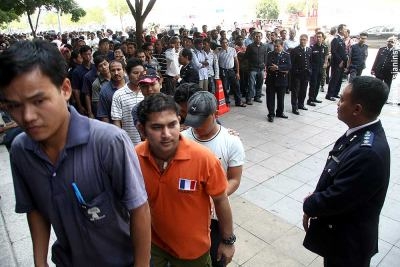
Image via Malaysian Insider
The truth however, is this.
“Putrajaya has squashed the perception that majority of crimes in the country were committed by foreigners, saying that the criminals were mostly locals.” – The Malaysian Insider, October 2013
And if they are responsible for a crime or two, it could be purely out of desperation. Many of them are in serious debt, to pay employment agents who brought them to Malaysia to work in the first place.
“For example, an Indonesian wanting to come and work in Malaysia would need to pay about RM9,000 in fees,” said Malaysian Employers Federation (MEF) President Datuk Shamsuddin Bardan in The Malaysian Insider.
Another recent horror story from The Guardian tells an even worse story of how a Nepalese man had to pay permit fees, AND was only given half his promised salary after his work stint.
“The only way he could afford the fees was to take out a loan for almost the entire amount with an annual interest rate of 36%. Despite such costs, Malaysia remains the most popular destination for Nepalese migrant workers.” – The Guardian, June 2014
In their desperation to pay off agency fees, that’s when workers become vulnerable to exploitation , according to a half-hour video report by Chan Tau Chou of Al-Jazeera. Datuk Shamsuddin suggested lowering these fees, which will then lower the number of illegal entries, because high fees make it financially difficult to enter legally.
He also told CILISOS that “If we revamp the way we collect rubbish – get automated lorries and give the workers smart, professional uniforms, Malaysians might take the job. This is how we need to transform the job market,”.
Nilai Murni Hari Ini: Foreign workers are humans just like us
Recently, the video Mums and Maids went viral. OK la it’s from Singapore, not Malaysia, but it reflects a similar situation in Malaysia – maids really know the kids they look after, sometimes even MORE than the children’s mothers. The objective was to encourage giving domestic workers a weekly day off. We couldn’t help feeling a bit sad when we watched it, because some maids might be mums themselves, and there they are so far from home and their own kids, while they look after someone else’s kid.
As little as we notice them sometimes, or forget that they’re a big part of our lives, they ARE! They do all the work Malaysians don’t want to do themselves. They clean our houses, our offices, they farm our lands, jaga our neighbourhoods, manufacture our baju, junk food, CILISOS *ahem*. And many of them work every single day of their lives here.
So this Labour Day, give your foreign workers a day off la. Better yet, if employers can give them off days regularly lagi BEST. Happy Labour Day… to ALL people living in Malaysia 🙂
- 8.1KShares
- Facebook7.9K
- Twitter36
- LinkedIn13
- Email40
- WhatsApp122




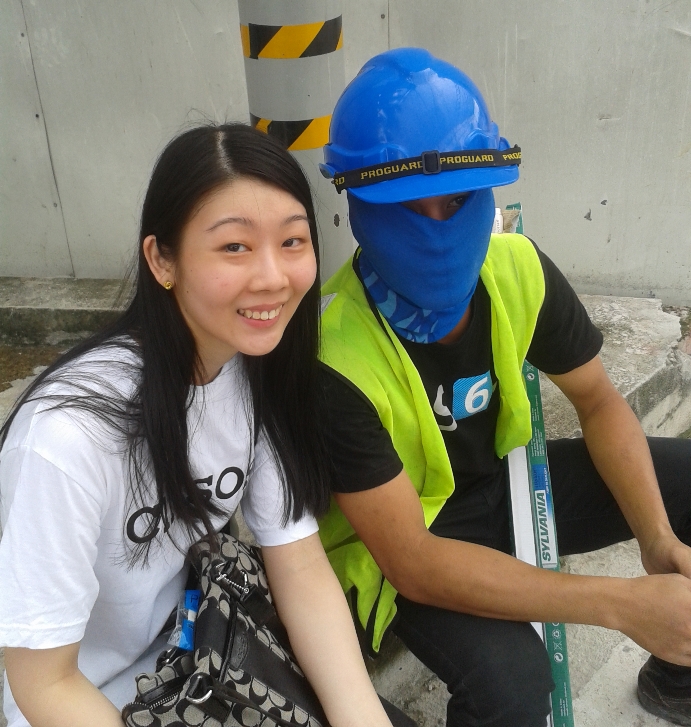
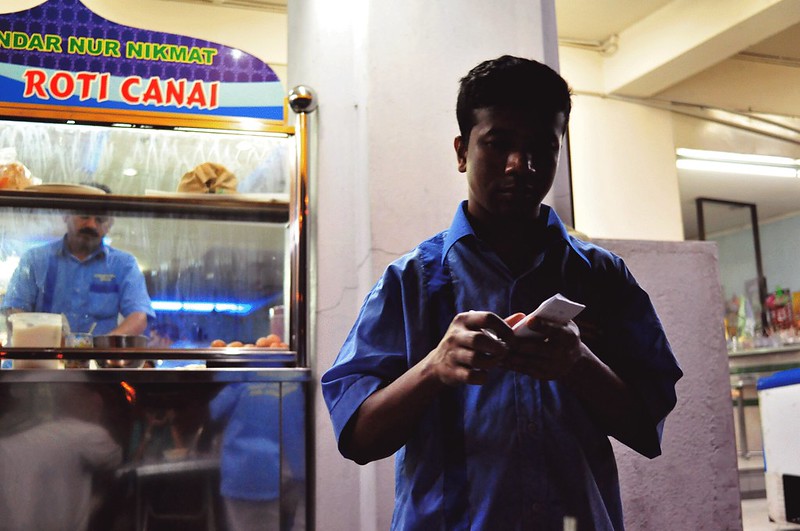
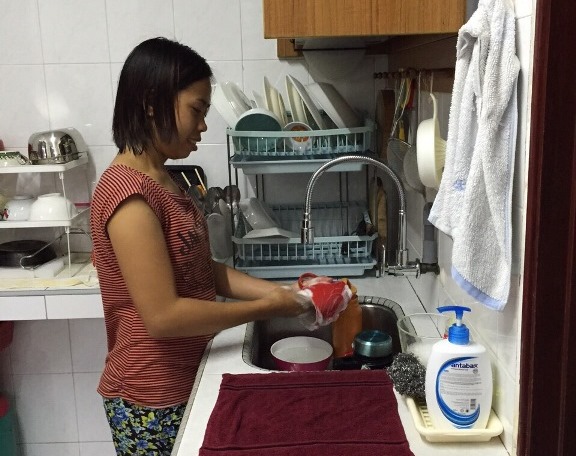
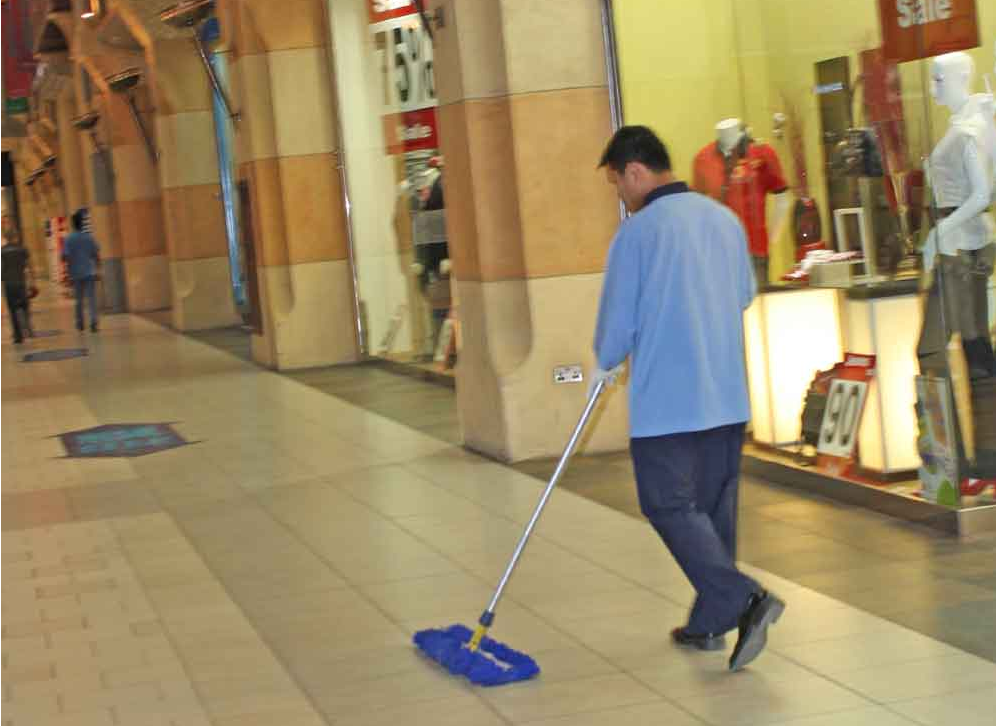

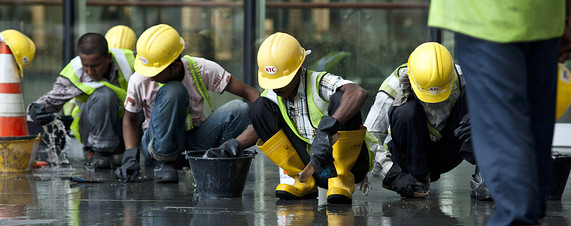







Pingback: 5 things I learned from begging at Masjid Jamek | CILISOS - Current Issues Tambah Pedas!
Pingback: Why this top Sabah student had to sneak into Indonesia to study | CILISOS - Current Issues Tambah Pedas!